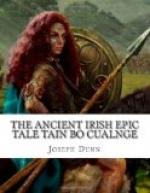While, on the whole, I believe the student will feel himself safer with a prose translation of a poem than with one in verse, it has seemed to me that a uniform translation of the Tain Bo Cualnge in prose would destroy one of its special characteristics, which is that in it both prose and verse are mingled. It was not in my power, however, to reproduce at once closely and clearly the metrical schemes and the rich musical quality of the Irish and at the same time compress within the compass of the Irish measure such an analytic language as English, which has to express by means of auxiliaries what is accomplished in Early Irish by inflection. But I hope to have accomplished the main object of distinguishing the verse from the prose without sacrifice of the thought by the simple device of turning the verse-passages into lines of the same syllabic length as those of the original—which is most often the normal seven-syllable line—but without any attempt at imitating the rhyme-system or alliteration.
In order not to swell the volume of the book, the notes have been reduced to the indispensable minimum, reserving the commentary and the apparatus of illustrative material for another volume, which we hope some day to be able to issue, wherein more definitely critical questions can be discussed. There are a few Irish words which have been retained in the translation and which require a word of explanation: The Old Irish geis (later, also geas[12]; plural geasa) has as much right to a place in the English vocabulary as the Polynesian word tabu, by which it is often translated. It is sometimes Englished “injunction,” “condition,” “prohibition,” “bond,” “ban,” “charm,” “magical decree,” or translated by the Scots-Gaelic “spells,” none of which, however, expresses the idea which the word had according to the ancient laws of Ireland. It was an adjuration by the honour of a man, and was either positive or negative. The person adjured was either compelled or made in duty bound to do a certain thing, or, more commonly, was prohibited from doing it. The Old Irish gilla is often translated “vassal,” “youth,” “boy,” “fellow,” “messenger,” “servant,” “page,” “squire” and “guide,” but these words bear false connotations for the society of the time, as does the Anglicised form of the word, “gillie,” which smacks of modern sport. It meant originally a youth in the third of the six ages of man. Compare the sense of the word varlet or valet in English, which was once “a more honourable




